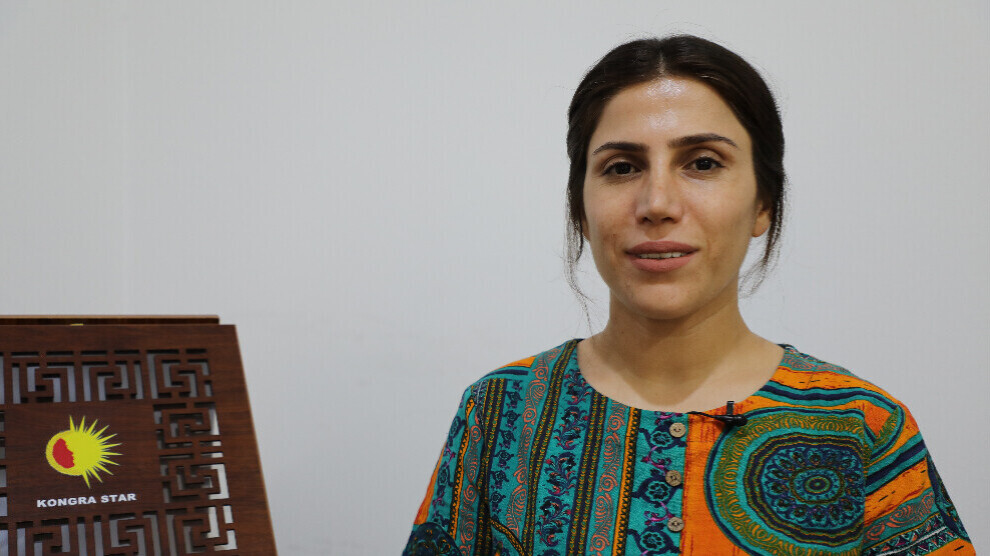Turkey's invasions of Afrin in 2018 and Girê Spî and Serêkaniyê in 2019 have led to serious human rights violations. The violence, especially against women in the occupied areas in northern Syria, continues to increase.
The period of occupation bears witness to crimes against humanity that threaten the lives of women and are directed against them. Women are exposed to rape, murder, kidnapping and other crimes under the occupation. The permanent threat is not limited to physical violence and also has psychological, social and economic dimensions. Women have been deprived of their right to a safe life.
According to the Center for the Protection and Research of Women's Rights in Northern and Eastern Syria, 164 women have been killed, 275 women have been kidnapped, and 246 women have been injured in Afrin, Girê Spî and Serêkaniyê since the occupation.
Kongra Star: Free women are considered dangerous
Rihan Temo, a member of the Democratic Relations and Alliances Committee of the Kongra Star women's association, spoke to ANF about the Turkish state's actions against women in the occupied territories. She said that the Rojava revolution was led by women and that, for this reason, women are systematically persecuted in the regions occupied by the Turkish state.
Temo said: "Unlike other countries, a democratic, equal and peaceful life was built in Northern and Eastern Syria during the Arab Spring. The male-dominated mentality in the occupied territories sees free women and pioneers as a threat and attacks them.
Femicide is taking place, a campaign of extermination against the will of women and a crime against humanity. Women in the occupied territories are subjected to rape, kidnapping, child marriage and murder. These practices are even worse than methods of war and should be considered a special war policy against women's freedom.
Every case of violence in Afrin, Girê Spî and Serêkaniye is an attack on the project of free coexistence in Northern and Eastern Syria. All women are affected by it. The Turkish state and the mercenaries it supports are systematically using violence, especially against the women of Afrin, who resisted the invasion for 58 days.
They are also plundering Afrin's nature. The cutting down of every single tree is considered violence against women, because these trees have blossomed and borne fruit thanks to the work of women. Therefore, violence against nature is also violence against women. And the population change in Serêkaniyê is an attack on women's culture, identity and existence."
Jin Jiyan Azadî Revolution
Rihan Temo pointed out the silence of international human rights organizations and said: "Women have entered the 21st century with the struggle to democratize world systems and assert their rights.
We call the 21st century the time of the women's revolution and see that violence against women is increasing as the demand for freedom grows louder. Women who organize and resist in Northern and Eastern Syria are targeted by the occupying forces. Under the Baath regime, women fighting for freedom were subjected to violence and arrest. Women in Rojhilat [Eastern Kurdistan/Western Iran] who organized in the Jin Jiyan Azadî revolution and resisted the system are also victims of violence. They are murdered, arrested and on death row.
Women's demands for democratic change are violently suppressed. International powers view women's struggle for freedom and their demands for rights as a threat to their system. Their silence in the face of violence against women therefore indirectly contributes to these practices. International human rights institutions and courts prefer to remain silent on these crimes."
Strengthening self-defense skills
Women living in the Turkish-occupied regions of Afrin, Serêkaniyê and Girê Spî should strengthen their self-defense, said Temo, adding: "The experiences in Northern and Eastern Syria were made possible by the resistance of women. Women have played an important role in many revolutions around the world, but there were deficiencies in areas such as self-defense, protecting their own identity and organization. As a result, women were unable to adequately protect themselves against the occupiers.
In the Turkish-occupied areas of Northern and Eastern Syria, women are exposed to systematic violence such as rape, massacres and kidnappings. Women who live under constant pressure are driven to suicide and suffer from serious psychological problems. A peaceful life is not possible in an atmosphere of fear. That is why women's organizations in the occupied territories must be strengthened, and their self-defense capabilities expanded."
Democratic World Women's Confederalism
Kongra Star is internationally networked and strives for a democratic world women's confederalism. As Rihan Temo underlined, the women's association is involved in a MENA alliance and in the Kurdistan coordination for the World Women's March, among other things.
Temo said: "There are many common themes in the relationships we have built in the Middle East. Violence and torture against women affect all women and must be fought together. We work with women from Egypt, Sudan, Tunisia, Iraq, Lebanon, Palestine and other countries and discuss organized self-defense.
Our efforts to organize ourselves under the umbrella of the Women's Confederalism aim to reach women who are affected by violence. At the same time, we want to be the voice of our people and the women living under occupation, documenting human rights violations in northern and eastern Syria and bringing them to international platforms."














